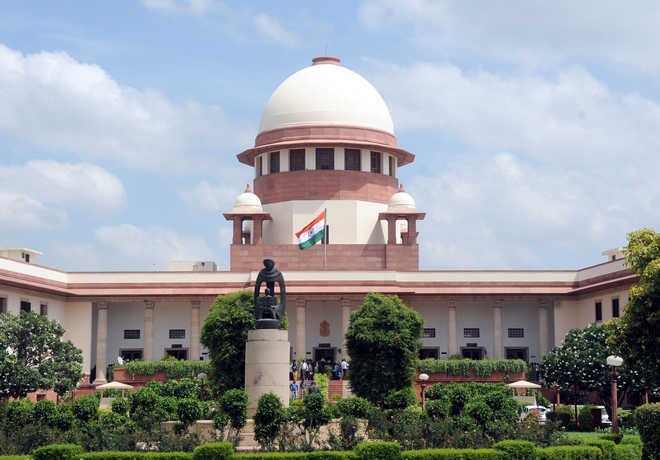NEW DELHI : Criminal cases against sitting and former lawmakers have increased over the last two years and strict monitoring at the micro level is needed by high courts to ensure expeditious disposal of cases against them, the Supreme Court was informed on Monday.
The total number of cases against sitting and former lawmakers are 4,859 as per a new report, while it was 4,442 in March 2020, the top court was apprised in a report filed before it.
“The number of cases pending against MPs/ MLAs (sitting and former) have increased over the last two years despite monitoring for expeditious disposal in the present proceedings.
“It is, therefore, submitted that strict monitoring, at a micro-level, by the High Courts is necessary to ensure expeditious disposal of the cases against legislators,” said the report filed by senior advocate Vijay Hansaria, assisted by advocate Sneha Kalita.
The report has been submitted in a petition filed in 2016 by BJP leader and advocate Ashwini Upadhyay and raised the issue of inordinately delay in disposal of criminal cases against former and sitting lawmakers.
The report stated that some high courts favoured constitution of Special Courts in each District, both at Sessions and Magisterial level.
“Many other High Courts have favoured trial by the respective jurisdictional courts with a mandate to take these cases on a priority basis. In some of the States, the High Courts have recommended constitution of zone-wise Special Courts.
“The High Courts have recommended the appointment of Nodal Prosecution Officer and Special Public prosecutor for each of the court and have written to the State Governments in this regard,” the report said.
All the High Courts have favoured setting up of Safe and Secure Witness Examination Room with video conference facility citing lack of infrastructure facilities and non-availability of funds for this, the amicus curiae told the court.
“No status report has been filed by the Union of India with respect to initiation and current stage of cases against the legislators pending before CBI, Enforcement Directorate and other central agencies, the grant of sanction and expected time for completion,” the report said.
There are 25 cases pending at sessions level and 62 at magistrate level in Delhi which include matters under Prevention of Money Laundering Act, 2002, Prevention of Corruption Act, 1988 and the like.
“The High Court is considering establishing four Special Courts, two at Sessions level and two at Magistrate level. A suo motu writ petition has been registered to monitor the trials and directions have been issued to list pending matters before the respective benches of the High Court,” the report said.
The report suggested that one special court at Bengaluru, which includes the number of cases under Prevention of Corruption Act, 1988 for the trial of 165 cases is not sufficient for disposal of cases.
The witnesses have to travel from long distance for participating in the trial which will affect a fair trial, it said, adding that “this court may direct the High Court to revisit its proposal to establish only one additional Court at Bengaluru”.
“Instead, it will be more appropriate to assign cases to the respective jurisdictional courts with a mandate to try the cases on a priority basis. Other cases may be allotted to such courts only having regard to the workload,” the report said.
Referring to West Bengal, the report said one Special Court at Barasat, 24 North Pargana is not sufficient for a trial of all 134 cases and if cases relate to different parts of the state, it will be inconvenient for witnesses to travel to Barasat to give evidence.
The report suggested that the High Court may be requested to establish more number of Special Courts.
With regard to Tamil Nadu, the report of the High Court shows that in 92 cases stay has been granted; however, the present action plan report does not indicate as to the steps taken for disposal of cases under stay.
Regarding Uttar Pradesh, the report said that Special Court at Allahabad has 12 adjoining districts and has 300 cases and expeditious disposal may not be possible of these cases in one Special Court.
“Thus, High Court may be requested to constitute Special Courts in the adjoining districts of Allahabad to lessen the burden of the Special Court at Allahabad.
“There are 85 cases of stay by the High Court. The Chief Justice of the High Court may be requested to constitute a special bench(s) for these cases. The High Court has pointed out that in some cases the accused persons are in other districts/ States, which is an obstacle in speedy disposal of cases,” it said.
The UP government may be directed to equip these courts electronically so that trial can proceed through video conferencing without the physical presence of the accused, the report said.
Pointing to Kerala High Court’s submission stating that “police personnel are reluctant to arrest and produce legislators”, the report said that it may be directed that the SP of the concerned district will be personally responsible for the execution of warrants.
“Similarly, if any legislator despite receipt of summons/ warrant does not appear before the court, he/ she will be liable for contempt of this Court apart from disciplinary proceedings,” it said.
In Punjab and Haryana, the trial of eight cases in Haryana and 10 cases in Punjab have been stayed by the High Court; however, the action plan does not show steps taken to list and dispose of such cases expeditiously, the report said. (AGENCIES)
Home Latest News Rise in cases against sitting, ex-lawmakers; need strict monitoring, says report filed...


